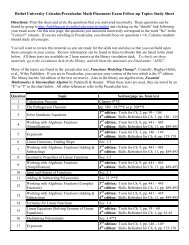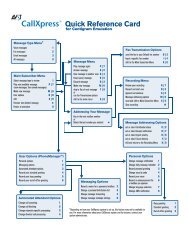here - College of Arts & Sciences - Bethel University
here - College of Arts & Sciences - Bethel University
here - College of Arts & Sciences - Bethel University
Create successful ePaper yourself
Turn your PDF publications into a flip-book with our unique Google optimized e-Paper software.
Fiat for politics:<br />
I think that fiat means the government gets their plan passed now. This “debate” about<br />
politics should begin after the passage <strong>of</strong> the plan. So politics links that argue about who<br />
voted for what and by what margin make little sense to me. Note: that also means that<br />
most “political capital” links seem either out <strong>of</strong> place or incorrectly argued in many<br />
debates. EG., Why would the president spend political capital to pass a plan that he<br />
never liked in the first place Why would it be seen as an olive branch He NEVER<br />
would have done the plan (that’s in<strong>here</strong>ncy). I think most opposition teams are asserting<br />
(actually fiating) these links, and they seem ridiculous to me. Fiat doesn’t mean you get a<br />
link to politics automatically because legislation was passed. Make some arguments<br />
about the specific government plan and the political ramifications <strong>of</strong> it being passed. I<br />
think fiat means the plan was passed. The government gets to fiat it into existence. So<br />
debate the political process that happens AFTER the passage <strong>of</strong> the plan. That still leaves<br />
plenty <strong>of</strong> political process disads.<br />
For parliamentary debate, I will follow what seems to be the norm for counterplans.<br />
They are unconditional (just like plans) unless otherwise noted. This consistency <strong>of</strong><br />
advocacy and arguments seems more appropriate for parliamentary debate, given no CX<br />
and fewer rebuttals.<br />
New arguments: Points <strong>of</strong> order are part <strong>of</strong> parliamentary debate. They allow both sides<br />
to explain why arguments are new or why they are legitimate extensions. Without these<br />
explanations that follow points <strong>of</strong> order, I cannot know for certain if an argument is new.<br />
T<strong>here</strong>fore, without a point <strong>of</strong> order, I will assume all arguments originated in a previous<br />
speech. If I end up voting on an argument that might be new in the rebuttal, it is not my<br />
fault for not noticing it, but the opposing team’s fault for not pointing it out. Don’t<br />
expect me to do the work for you.<br />
T debates are fine. Plans should be topical.<br />
Spec debates are okay, but harder to win in parliamentary debate given the limited<br />
amount <strong>of</strong> prep time the government team has to write their plan. It would be nice if the<br />
plan specified whatever it needs to. Opposition debaters need to show some actual abuse<br />
in order to win them. Burdens are higher for spec debates. But sometimes a spec<br />
argument makes sense.<br />
71
















